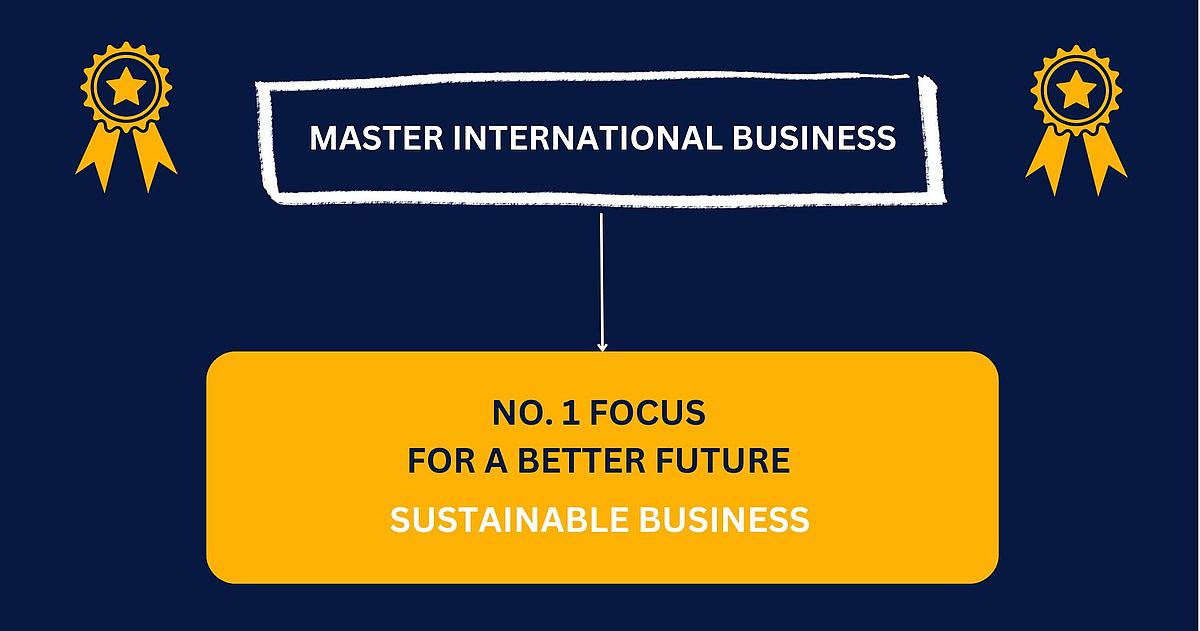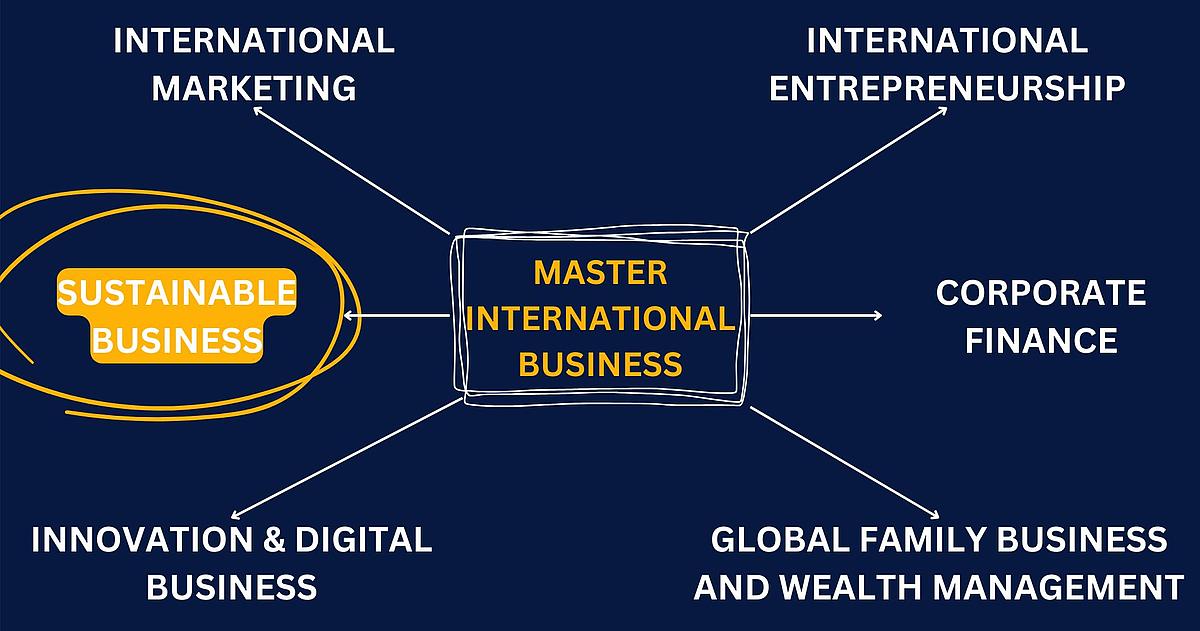This Website uses cookies to improve your visit on our website. More Info
Sustainable Business
- MBS QUICK FACTS:
- State-recognized since 1999
- February and September
- 18 or 24 Months
- English
- Book a consultation appointment

DID YOU KNOW?
In 2024, Munich Business School secured the top spot among private universities of applied sciences in the field of business administration from a recruitment perspective for the fifth time in a row.
Sustainability is a concept that aims to meet the needs of the present without compromising the ability of future generations to meet their own needs. It is based on the idea of using and managing natural resources in a way that ensures long-term environmental, social and economic stability.
The concept of sustainability is often broken down into three dimensions:
Sustainability seeks to balance these three areas to ensure a future that is both environmentally sound and livable for all people.
Download Information Material
In our exclusive and non-binding information material, you can find out everything you need to know about:
To successfully complete a sustainability degree and later work in this field, certain prerequisites, skills and personal qualities are helpful:
These requirements, skills and characteristics help students to overcome the challenges of a sustainability degree and to succeed in professions in this field.

The following diagram shows that Sustainable Business is the No. 1 focus for a better future for the MBS Master International Business degree program.

Studying sustainability not only provides a deeper understanding of the challenges our world faces, but also offers the chance to actively contribute to solutions. Here are some reasons why it makes sense to study sustainability:
In summary, a course of study in sustainability is an investment in the future, both for one's own professional career and for the protection of the environment and the well-being of future generations.
At Munich Business School, you can study International Business in the Master's program with a focus on sustainability. This gives you the perfect mix of Business Studies knowledge and sustainable business experience to shape your future according to your ideas. These are the most important facts about studying at MBS:
18 or 24 Months
Master of Arts
February & September
Master in International Business
English
EUR 8.580 per Semester
In person at the campus in Munich
Choose your own Specialization & include a Semester abroad
7 areas of focus, including Sustainable Business
This is what you will learn in sustainability studies
| Introduction to Sustainability | Fundamentals and definitions of sustainability, its ecological, social and economic dimensions. |
|---|---|
| Environmental Sciences | Ecosystems, biodiversity, climate change, air and water pollution, and sustainable resource management. |
| Sustainable Economy | Concepts of circular economy, sustainable business, environmental economics and their applications in various industries. |
| Social Science Perspectives | Social justice, development policy and ethical issues of sustainability. |
| Climate protection and energy transition | Strategies for reducing CO2 emissions, renewable energies and technological developments to promote a clean energy supply. |
| Environmental management and law | Guidelines, environmental certification, environmental law and regulatory requirements for companies and organizations. |
| Data collection and analysis methods | Statistical methods, qualitative research and analysis tools for evaluating ecological and social projects. |
| Project and innovation management | Planning, implementing and managing projects that promote sustainable solutions. |
| Communication and public relations | Strategies for communicating sustainability issues and communicating effectively with different target groups. |
| Practical project work and case studies | Applying real-life scenarios to gain practical experience and transfer theory into practice. |
The content of a sustainability degree program covers a wide range of topics to prepare students for the complex challenges in the field of sustainability. This content offers a comprehensive apprenticeship that is interdisciplinary and provides both theoretical knowledge and practical skills.
Studies in Business Studies with a focus on sustainability offer a valuable combination of in-depth economic knowledge and specialized sustainability know-how.

While a course of study dedicated to sustainability provides in-depth knowledge of ecological and social issues, combining it with Business Studies gives you a broader and more strategic understanding. This is because, to successfully implement sustainable approaches, it is crucial to also understand economic interrelationships and business management tools.
With a solid foundation in Business Studies and a specialization in sustainability, you will not only be able to develop sustainable practices, but also implement them efficiently and cost-effectively in companies. You will learn to strategically anchor sustainability in a way that is economically viable at the same time. This is particularly in demand as companies are increasingly striving to combine ecological and social responsibility with economic success.
In addition, the combination of Business Studies and sustainability makes you a sought-after specialist who has both the economic and the sustainable know-how to excel in management positions. This dual expertise opens up a wider range of career opportunities for you and gives you an advantage in the job market – whether you are looking for a job in a company, an NGO or a public organization that wants to reconcile sustainable goals with economic success.

MBS not only offers you a first-class Business Studies program, but also focuses on international business so that you can easily pursue your chosen career anywhere in the world after graduation. The Master International Business at MBS offers many highlights such as semesters abroad, internships, business projects, plenty of networking opportunities and much more. At Munich Business School, you can expect small study groups, dedicated teachers and award-winning programs with many interesting specializations. But more importantly, you count as a person with us. Here, you are not an anonymous member, but the driving force that motivates us every morning. As a small, private university, we take time for your concerns and offer you a customized study experience. Our lecturers have extensive practical experience and teach you skills that really count. In addition to sound business knowledge, we also promote values and abilities that will teach you social responsibility as a future sustainability expert and optimally prepare you for a wide range of professions in your desired field.
Do you want to learn more about Business Studies?
For more information, please visit our page on the subject.
Business StudiesMBS offers students many advantages that are particularly possible thanks to the structure of a private university of applied sciences. You will benefit from these during your studies at MBS:
Professors with business experience and specialists as guest lecturers
Small class sizes and support from the Career Center, for example
in Finance and Management
Wide-ranging Business Studies and specialized knowledge in several key areas
Staying abroad included & many Networking opportunities
The program and completion of a sustainability degree are often clearly structured to prepare students comprehensively for their future work. Here is an overview:
Introduction phase (1st to 2nd semester):
Consolidation phase (3rd to 5th semester):
Practical phase:
Final phase (6th to 7th semester):
This structured program ensures that students gain both theoretical knowledge and practical experience, providing them with comprehensive preparation for the professional world.
Do you feel at home anywhere in the world and want to start an international career? Then the Master in International Business Management at MBS is perfect for you! You will not only deepen your knowledge of economics, but will also become an expert in various fields through individually selectable specializations, thus sharpening your personal profile. The integrated semester abroad will prepare you for specialist and management roles in the global economy. If you want to gain even more international experience, you can add a second semester abroad and thus obtain two specialized master's degrees in just two years – your international career will then be ready to take off with the Master in International Business Administration!
The course-specific modules of the Master's program in International Management prepare you optimally for your career in international business. To ensure a strong practical focus during your studies, the Master's program offers specific concentrations in addition to general business administration and courses in international marketing and international finance. In the first and second semesters, you choose two out of five or seven business concentrations, respectively, giving your studies an individual touch. You can choose from topics such as digital business management, international marketing or corporate strategy & innovation. These courses will enable you to deepen your skills and prepare you specifically for your future career.
The studies at MBS focus on the international market. A large part of the course content is taught in English and MBS students come from all over the world.
Internationality is also expressed through the semester abroad. Students spend the last semester at one of our more than 60 partner universities around the world.
Students work on a business project for a real company. In doing so, they apply the theoretical knowledge gained during their studies in practical applications.
The following scheme shows all specializations that you can take in your Master International Business studies at Munich Business School, including Sustainability.

The English-language Master's in International Business with a focus on Sustainable Business at Munich Business School provides you with in-depth knowledge of sustainability management in three semesters. You will learn the principles of sustainable management, deal with complex topics such as circular economy and immerse yourself together with your fellow students in future-oriented scientific disciplines such as human-centered design and biomimicry to develop innovative sustainability methods based on the interaction between people and nature. You will spend the first two semesters on campus in Munich, where you will experience how sustainable business works in practice in interactive lectures and practical projects. You combine your focus on Sustainable Business with a further specialization such as Innovation & Digital Business or International Marketing, thus designing your Master's program in International Business entirely according to your own preferences.
In the third semester, you will transfer to one of our more than 60 partner universities worldwide. With locations on four continents, there is a wide selection to choose from. Finally, the Master's thesis rounds off your studies.
If you have any further questions or need more information, please do not hesitate to contact our student advisory service.
Application
In order to qualify for the Master International Business study program, you must fulfill academic, linguistic, and to some extent professional requirements.
You may submit your application documents at any time. Since the places are limited, we advise you to apply for your desired study start as early as possible.
The main requirement for admission to the Master International Business study program is a successful Bachelor's degree (180 ECTS or more). Applicants with a degree in Business Studies/Management/Economics are entitled to apply for the program directly, applicants without a degree in economics can qualify for the program by completing the Pre Master Program. Upon request, we will gladly verify your documents in advance. Please contact your Program Advisor.
English Proficiency
Applicants must proof their English language skills by passing one of the following language tests:
Note: If the test is also used to apply for a visa, please check the requirements of the respective embassy in advance.
Test results can only be accepted if achieved within the last two years. If you are unable to obtain your test results before handing in your MBS application, please inform us about your planned test date.
The English proficiency test can be waived by the following candidates:
We accept applications all year round. However, we recommend that you apply as early as possible, as the number of places is limited.
Spring semester (Master International Business only)
Applicants from Vietnam, China and India should allow an extra month to apply for the relevant visas.
Winter semester
Applicants from Vietnam, China and India should allow an extra month to apply for the relevant visas.
You must submit the following mandatory documents for us to consider your written application:
*Please submit the relevant original document, or a certified copy, as soon as you are accepted onto the program.
Online application:
Apply online for the Master’s program in International Business
Eligible applicants will be invited to a personal interview, either in person in Munich or online via Microsoft Teams (approx. 30–45 minutes). The interview may include examining a case study.
As soon as you are accepted onto the program, you will have the opportunity to get to know Munich Business School a little better – before you make the final decision about your studies. And, of course, our student advisors will be available to answer any questions you have.
When we confirm your place, we will send you confirmation of your acceptance along with two copies of your study contact. To secure your place, please sign and return one copy of the contract to us within two weeks. You can keep the other copy for your files.
Additionally, in order to be formally accepted onto the program, you must pay a one-off matriculation fee of €690 (EU/EFTA) or €1,490 (non-EU) and make an advance payment of €1.990. This advance payment will be deducted from your first tuition fee payment.
If you are a non-EU citizen, you must apply for a student visa in order to start your studies in Germany. You will require a letter of invitation from Munich Business School to secure your visa – which we will be happy to provide once we receive your signed student contract and a copy of your passport.
Munich Business School offers attractive scholarship programs amount up to EUR 4,000 of the overall tuition fee. (Up to EUR 2,000 on the 1st and 2nd master's semester).
If you wish to apply for a scholarship, you should include an application when you submit your overall application. You can find further information on our scholarships and financing page.

"Degree Content:
The curriculum at Munich Business School is comprehensive and relevant to today's business world.
Professors:
The faculty at MBS is one of its strongest assets. Professors are not only highly qualified in their fields but also approachable and supportive. They bring real-world experience into their teaching, which adds significant value to the learning process."
Chamaiporn on StudyCHECK

The salary after studying sustainability can vary greatly depending on the professional field, experience and employer. Here are some examples of typical salary ranges in example occupations that alumni could take up after graduation:
Factors influencing salary:
Overall, the salary after a sustainability degree can reach an attractive level, especially if you specialize and gain professional experience.
The Munich Business School in Numbers
This table shows the wide range of possible occupations after studying sustainability.
| Occupation | Description |
|---|---|
| Sustainability manager | Development and implementation of sustainability strategies in companies or organizations. |
| CSR manager | Promotion and management of social and environmental projects within a company. |
| Environmental consultant | Advice on environmentally friendly practices and compliance with environmental regulations. |
| Climate protection manager | Planning and implementation of measures to reduce greenhouse gas emissions. |
| Project manager for renewable energies | Implementation of projects in the field of sustainable energy sources such as solar and wind energy. |
| Sustainability officer in the public sector | Development and promotion of sustainable strategies at various political levels. |
| Researcher or lecturer | Conducting studies or teaching in the field of the environment and sustainability. |
| Consultant for sustainable financing | Implementation of investment strategies that promote ecological and social responsibility. |
| Environmental scientist | Research and analysis of environmental processes to develop solutions. |
| Urban planner for sustainable development | Planning of cities with a focus on ecological and social aspects. |
| Conservation officer | Management of biodiversity conservation programs for NGOs or governmental organizations. |
| Energy consultant | Advising on improving energy efficiency and using sustainable energy sources. |
| Sustainable supply chain consultant | Optimizing supply chains with regard to fair and environmentally friendly conditions. |
| Development cooperation project manager | Managing sustainable projects in international organizations. |
| Sustainable product designer | Designing resource-efficient and easily recyclable products. |
| Communications manager for environmental and sustainability issues | Public relations work to raise awareness of sustainability and environmental protection. |
DID YOU KNOW?
After an MBS Bachelor's or Master's degree, you can also take up all these professions abroad without any problems.
The diversity of sustainability is reflected in a number of exciting professional fields. Here is a closer look at three examples of professions:

The main task of a sustainability manager is to develop and implement sustainable strategies in companies. This includes monitoring projects to conserve resources, reporting on environmental indicators and training employees. This profession is special because it directly contributes to making a company more environmentally friendly and promotes sustainable business practices.
Responsible for planning and implementing climate protection measures, including analyzing emission sources and developing reduction plans. This job is special because it has a direct impact on reducing CO2 emissions and thus contributes to global climate protection.


Optimizes supply chains to ensure they function under fair and environmentally friendly conditions. Responsibilities include analyzing production processes, ensuring ethical standards and working with suppliers to improve sustainability. The profession is special because it helps companies combine social responsibility with economic success.
A Master in Sustainability is a postgraduate program that provides you with in-depth knowledge and skills to address ecological, economic and social challenges. You will learn to develop sustainable strategies, lead projects and find innovative solutions to complex problems. The studies are interdisciplinary and prepare you for responsible positions in companies, NGOs or public institutions, in order to actively contribute to sustainable development.
Sustainability is important in the study of environmental science because it gives you a holistic understanding of how natural systems work and how human activities affect them. It helps you develop solutions that balance ecological, social and economic needs to ensure the long-term health of the planet and the well-being of future generations.
The study of sustainability deals with the ecological, social and economic aspects of sustainable development. You will learn how resources can be used responsibly to meet the needs of the present generation without compromising the opportunities of future generations. It has an interdisciplinary focus and provides you with the knowledge and skills to develop and implement sustainable solutions to global challenges.
A study of ecological sustainability focuses on giving you an in-depth understanding of how to protect and preserve natural resources. You'll learn how to analyze environmental problems and develop solutions that maintain ecological balances by studying ecological processes, conservation efforts and sustainable management to minimize long-term environmental impacts.
Yes, a master's in sustainability is worthwhile if you are looking for a career with purpose and want to work in future-oriented fields. It offers you specialized knowledge, increases your job opportunities in various industries and enables you to actively contribute to solving global challenges.


